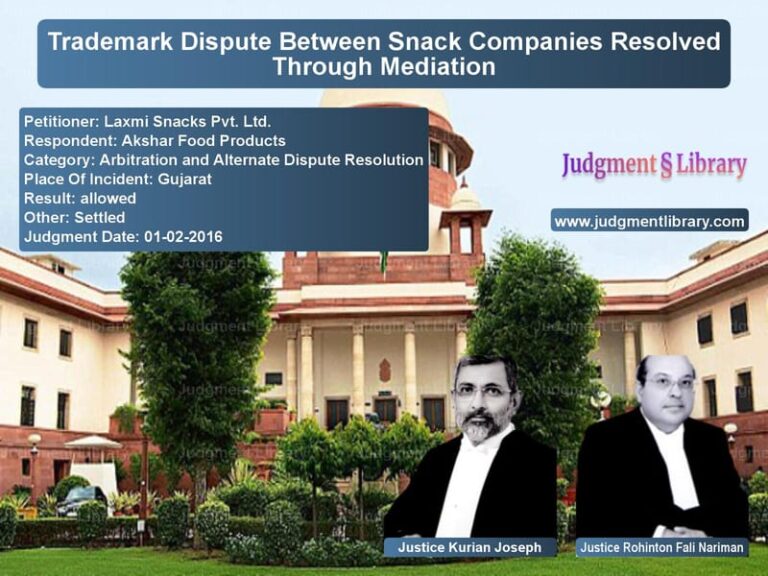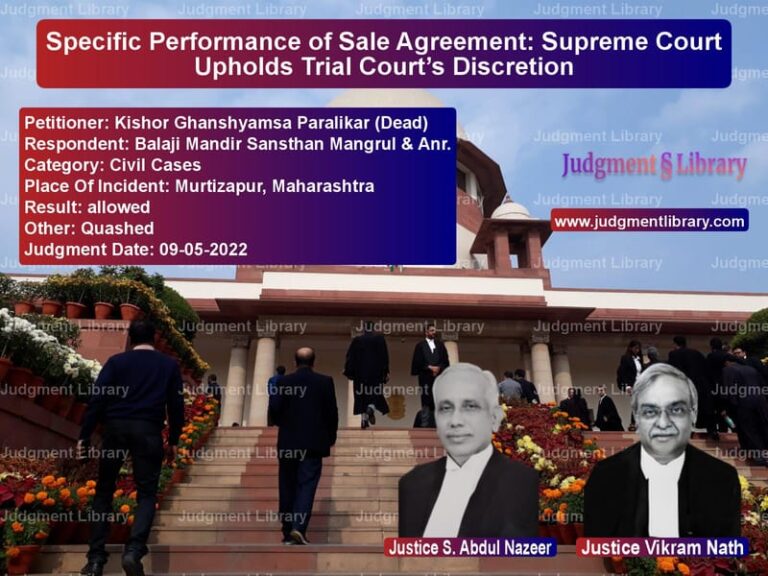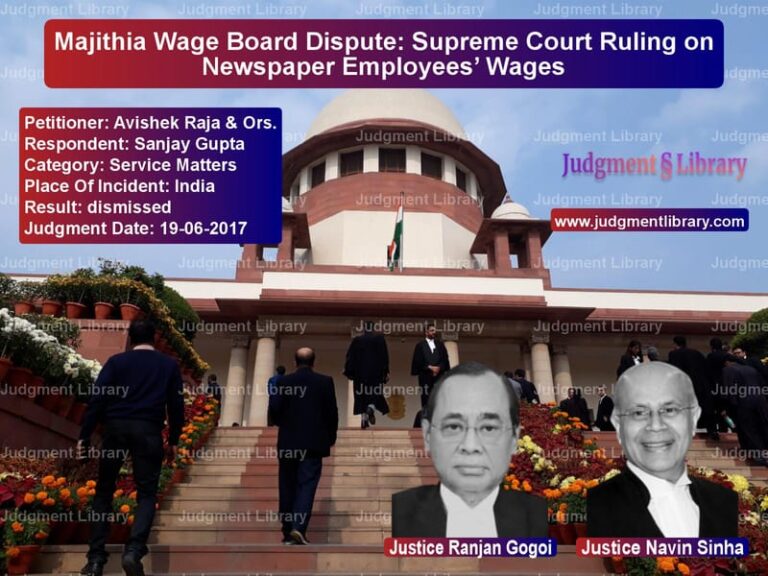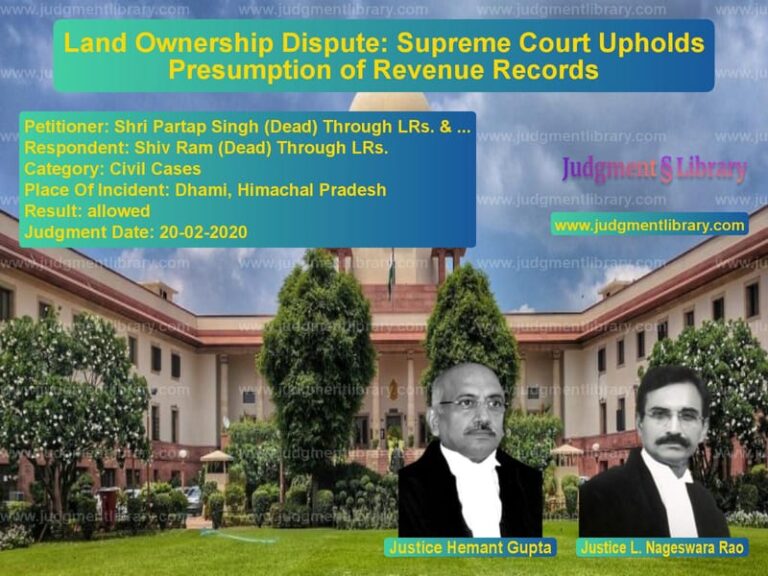Entry Tax and Casual Trader Status: Supreme Court Upholds Rajasthan High Court’s Ruling
The Supreme Court of India in Commercial Taxes Officer, Circle-B, Bharatpur vs. M/s Bhagat Singh addressed a critical issue concerning the levy of entry tax on the purchase of a motor vehicle and the limitation period for assessment under the Rajasthan Tax on Entry of Motor Vehicle into Local Areas Act, 1988. The case examined whether a single transaction of purchasing a motor vehicle qualifies the buyer as a ‘Casual Trader’ and whether the assessment order was barred by limitation.
The Court dismissed the Special Leave Petition (SLP) filed by the Commercial Taxes Officer, Bharatpur, upholding the Rajasthan High Court’s decision, which ruled that the assessment order was time-barred as the respondent was a ‘Casual Trader.’
Background of the Case
The respondent, M/s Bhagat Singh, purchased a truck from M/s Ashok Auto Sales Ltd. of Aligarh, Uttar Pradesh, on December 26, 2009, for Rs. 16,20,000. The vehicle was subsequently registered in Bharatpur, Rajasthan.
On July 11, 2012, nearly three years after the purchase, the respondent was served a summons under Sections 3, 6, and 7 of the Rajasthan Entry Tax Act, 1988, requiring him to pay entry tax. However, the respondent failed to appear in response to the summons, leading to the passing of an Assessment Order on October 9, 2012, imposing a tax of Rs. 2,26,800 (14% of the purchase value), a penalty of Rs. 1,000, and interest of Rs. 72,576, totaling Rs. 3,00,376.
Aggrieved, the respondent filed an appeal before the Appellate Authority, Commercial Tax Department, Bharatpur, contending that:
- The summons was received after the assessment date.
- The assessment order was barred by limitation as it was issued beyond two years from the purchase date.
- The liability to pay entry tax was disputed.
Key Legal Issues Addressed
1. Whether the Respondent Was a ‘Casual Trader’
The Rajasthan Entry Tax Act, 1988, imposes tax on vehicles entering the state for use or sale. Under Section 3, tax liability arises when a vehicle is registered in Rajasthan and is not already registered in another state for at least 15 months.
The respondent argued that as a one-time purchaser, he qualified as a ‘Casual Trader’ under the Rajasthan Sales Tax Act, 1954, which defines a ‘Casual Trader’ as:
“A person who has occasional transactions of buying, selling, or distributing specified goods.”
Under Section 10B of the Rajasthan Sales Tax Act, 1954, an assessment against a ‘Casual Trader’ must be made within:
- One year from the date of filing a report by the trader.
- Two years from the date of transaction, in the absence of such a report.
2. Whether the Assessment Was Barred by Limitation
The vehicle was purchased on December 26, 2009. The assessment order was passed on October 9, 2012, well beyond the two-year limitation period stipulated for ‘Casual Traders.’
The Appellate Authority set aside the assessment order, agreeing with the respondent that:
“The limitation for passing an assessment order against a Casual Trader is two years from the date of the transaction. Since the assessment was made after this period, it is time-barred.”
On appeal, the Rajasthan Tax Board upheld the Appellate Authority’s decision, dismissing the state’s contention that a single transaction does not make a person a ‘Casual Trader.’ The Rajasthan High Court affirmed this view, leading to the Special Leave Petition before the Supreme Court.
Read also: https://judgmentlibrary.com/gst-levy-on-lottery-and-taxable-goods-constitutional-validity-upheld/
Findings of the Supreme Court
1. Plurality of Transactions Not a Requirement for ‘Casual Trader’ Status
The state argued that a ‘Casual Trader’ must have multiple transactions to qualify under the definition. However, the Supreme Court rejected this interpretation, stating:
“The statutory provision does not impose any requirement that a person must engage in multiple transactions to be classified as a ‘Casual Trader.’ A single transaction of purchase and sale is sufficient to meet the statutory definition.”
The Court relied on the General Clauses Act, 1897, which provides that words in the singular include the plural and vice versa unless the context dictates otherwise.
2. Limitation Period Strictly Applies
The Supreme Court emphasized the importance of statutory time limits, holding:
“In tax matters, the period of limitation must be strictly adhered to. The assessment order in question was passed well beyond the permissible period of two years, making it legally unsustainable.”
3. No Grounds for Interference Under Article 136
The Court declined to interfere with the Rajasthan High Court’s decision, reaffirming the principle that statutory authorities must adhere to prescribed time limits. The Court observed:
“The findings of the Appellate Authority, Rajasthan Tax Board, and the High Court are based on a correct interpretation of the statutory provisions. No grounds exist for interference under Article 136 of the Constitution.”
Supreme Court’s Verdict
The Supreme Court dismissed the Special Leave Petition, concluding that:
- The respondent was correctly classified as a ‘Casual Trader.’
- The assessment order was time-barred as it was issued beyond two years from the transaction date.
- The interpretation that multiple transactions are required for ‘Casual Trader’ status is incorrect.
Conclusion
This ruling reaffirms critical principles in tax law:
- A single transaction can qualify a person as a ‘Casual Trader.’
- Statutory time limits for assessment must be strictly followed.
- Tax authorities cannot circumvent limitation provisions to enforce tax liabilities beyond the prescribed period.
The decision ensures that taxpayers are not subjected to arbitrary assessments beyond the legally permissible time frame, upholding the rule of law in tax administration.
Petitioner Name: Commercial Taxes Officer, Circle-B, Bharatpur.Respondent Name: M/s Bhagat Singh.Judgment By: Justice Indira Banerjee, Justice Sanjiv Khanna.Place Of Incident: Bharatpur, Rajasthan.Judgment Date: 21-01-2021.
Don’t miss out on the full details! Download the complete judgment in PDF format below and gain valuable insights instantly!
Download Judgment: commercial-taxes-off-vs-ms-bhagat-singh-supreme-court-of-india-judgment-dated-21-01-2021.pdf
Directly Download Judgment: Directly download this Judgment
See all petitions in Tax Refund Disputes
See all petitions in Banking Regulations
See all petitions in Judgment by Indira Banerjee
See all petitions in Judgment by Sanjiv Khanna
See all petitions in dismissed
See all petitions in supreme court of India judgments January 2021
See all petitions in 2021 judgments
See all posts in Taxation and Financial Cases Category
See all allowed petitions in Taxation and Financial Cases Category
See all Dismissed petitions in Taxation and Financial Cases Category
See all partially allowed petitions in Taxation and Financial Cases Category







